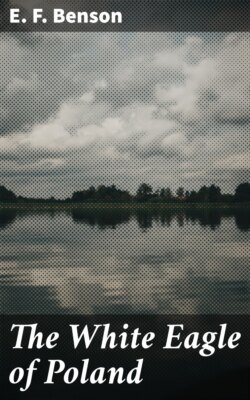The White Eagle of Poland

Реклама. ООО «ЛитРес», ИНН: 7719571260.
Оглавление
E F Benson. The White Eagle of Poland
The White Eagle of Poland
Table of Contents
PREFACE
PART I. THE RECONSTRUCTION OF POLAND
CHAPTER I. Poland and Mittel-Europa
CHAPTER II. Poland under the Partitions
CHAPTER III. Poland and the Entente
(ii) Polish Parties
(iii) The Question of Lithuania
CHAPTER IV. Poland’s Place in New Europe
PART II. THE GERMAN OCCUPATION OF POLAND
CHAPTER I. The Russian Proclamation
CHAPTER II. The First Year of the German Occupation
CHAPTER III. ATTEMPTED SOLUTIONS
CHAPTER IV. POLISH INDEPENDENCE (MADE IN GERMANY)
CHAPTER V
(i) THE POLISH LEGIONS
(ii) Further “Independence” of Poland
Отрывок из книги
E. F. Benson
Published by Good Press, 2022
.....
Table of Contents
The claims of the Poles themselves to be reunited into an independent kingdom rest on historical and ethnographical grounds which it is necessary to state briefly in order that these claims may be appreciated and understood. Little as they or the basis on which they rest are known in England, it is the duty of the Allies, so the champions of Polish union and independence assert, to recognise and act on them, since they have repeatedly insisted on the rights of all nations to their national territory. The Allies for instance demand the retrocession of Alsace and Lorraine to France, although the present possession of those provinces by Germany is a matter altogether outside the present war. But those provinces, plucked from France in 1870 are rightfully French, and must be re-united to France just as certainly as Belgium must be given back to the Belgians. In the same way, they contend, there are certain provinces in Germany, Austria and Russia, which for historical and ethnographical reasons must be united and restored to form an independent Kingdom of Poland. They are inhabited by a Polish population, which is quite distinct from the various nations who have partitioned its territories among themselves, and the fact that Poland has suffered so long under this wrongful appropriation which was finally confirmed more than a century ago does not abrogate or dilute the justice of the claim. A national injustice does not lapse with the mere passage of time, if present conditions still render it unjust. It cannot, like a right of way, be established and legalized by mere usage. And this particular injustice has not lapsed, because the territories of ancient Poland, now for more than a hundred years divided among the ambient powers, are for the most part still Polish in blood, in language, in sentiment, and in religion. The Polish race has neither died out, nor has it been merged in the blood of the nations who have appropriated its territory. It exists to-day more numerous and more conscious of its national existence than ever before. Among other symptoms of this we may note the fact that apart from what is known as the Golden age of Polish literature in the 16th Century; the whole of Poland’s artistic and literary achievements have blossomed after the partition.
.....